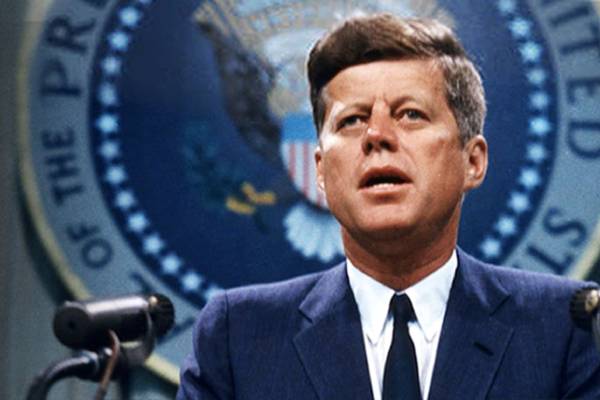Thousands of documents related to the 1963 assassination of US President John F Kennedy were released but many other sensitive records on the killing were kept secret for another year for “national security” reasons.
The release of 13,173 documents on Thursday was not expected to include any new bombshells or change the conclusion reached by the commission led by Chief Justice Earl Warren that Lee Harvey Oswald, a former Marine and communist activist who had lived in the erstwhile Soviet Union, acted alone.
However, the latest cache will be useful for historians focusing on the events around the assassination.
Kennedy was shot dead while riding in his motorcade through Dallas on November 22, 1963, at the age of 46. Thousands of books, articles, TV shows and films have explored the idea that Kennedy’s assassination was the result of an elaborate conspiracy.
None has produced conclusive proof that Oswald – who was fatally shot by nightclub owner Jack Ruby two days after Kennedy’s killing – worked with anyone else, although they retain a powerful cultural currency.
Many of the documents released on Thursday belonged to the Central Intelligence Agency (CIA), including several that focused on Oswald’s movements and his contacts.
Other documents focus on requests from the Warren Commission investigating the assassination. The documents show the US government opened a so-called 201 file on Oswald in December 1960, nearly three years before Kennedy’s murder and after Oswald’s failed defection to the Soviet Union in 1959.
Some 515 documents remained withheld in full and another 2,545 withheld in part, said the National Archives.
Jefferson Morley, vice president of the Mary Ferrell Foundation that sued the Biden administration in October over the delay of the document drop, questioned why decades later there are still redactions and blocked information on Kennedy’s murder.
“What the CIA has hidden,” is whether the CIA had “operational interest in Oswald” at the time of the assassination, Morley told the Washington Post.
A December 1963 document described how CIA officials in Mexico City “intercepted a telephone call” Oswald made in October from that city to the Soviet embassy there “using his own name” and speaking “broken Russian”.
Oswald was hoping to travel through Cuba on his way to Russia and was seeking a visa, documents show. There were initial concerns that Ruby, Oswald’s killer, might have had some connection to Oswald.
But a newly released September 1964 memo to the presidential commission investigating the assassination said “the Central Intelligence Agency has no indication that Ruby and Lee Harvey Oswald ever knew each other, were associated, or might have been connected in any manner”.
Congress in 1992 had ordered that all remaining sealed files pertaining to the investigation into Kennedy’s death should be fully opened to the public through the National Archives in 25 years, by October 26, 2017, except for those the president authorised for further withholding. In 2017, then-President Donald Trump released a cache of records, but decided to release the remaining documents on a rolling basis.
All of the remaining JFK files were originally supposed to have been released in October 2021. Biden postponed that planned release, citing delays caused by the COVID-19 pandemic, and announced they would be instead disclosed in two batches: one on December 15, 2021, and another by December 15, 2022, after undergoing an intensive one-year review.
With Thursday’s release, 95 percent of the documents in the CIA’s JFK assassination records collection will have been released in their entirety, a CIA spokesperson said in a statement, and no documents will remain redacted or withheld in full after an “intensive one-year review” of all previously unreleased information.
In a memorandum, Biden said until May 1, 2023, the National Archives and relevant agencies “shall jointly review the remaining redactions in the records that had not been publicly disclosed”.
After that review, “any information withheld from public disclosure that agencies do not recommend for continued postponement” will be released by June 30, 2023.














